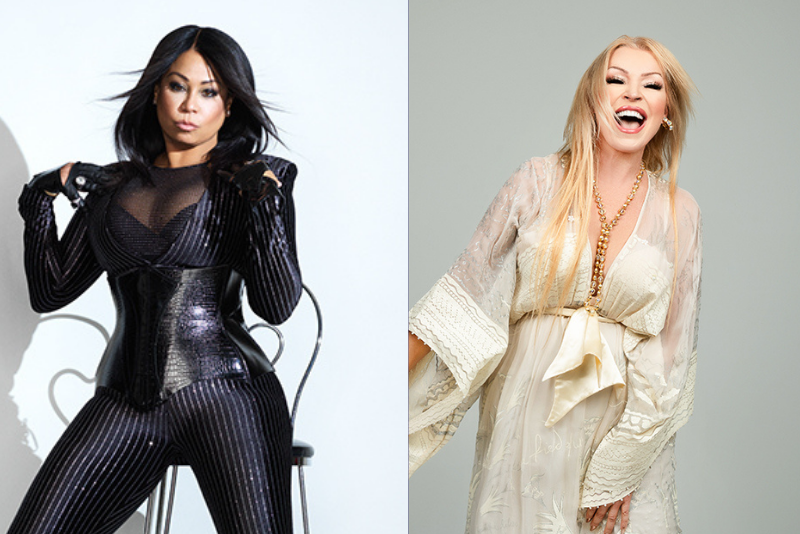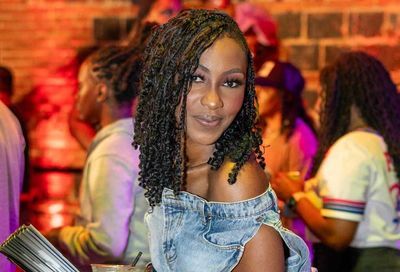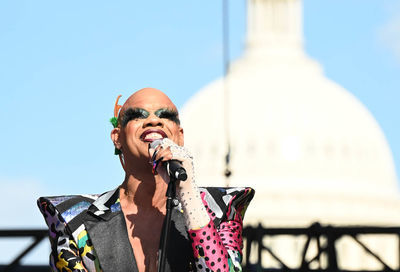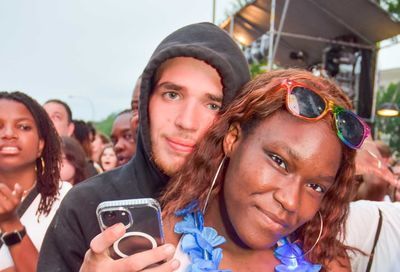Outside, Looking In
Interview with Richard Morel
“Outsider” is a pretty loaded word, with connotations mired in images of 10th grade outcasts in black trenchcoats, serial killers, and Harley-straddling Peter Fondas. So when Richard Morel — a self-described outsider — turns out to be so…well, normal, it’s a little disconcerting. Swiveling restlessly in his chair, he talks about how he always cries at movies (“especially on airplanes, I think it’s the altitude”) and how he loves the geniality of mid-Westerners. His lighthearted demeanor makes it easy to forget that this is the man behind the controversial “True (The Faggot is You),” a song which prompted a volley of accusations of racism and bigotry.
Morel’s unflinching portrayals of reality’s dark side have made him a distinct voice in the typically glitter-strewn club scene. Since his collaborations with local DJ team Deep Dish in 1997, he’s become a remixing guru under the moniker of Pink Noise Productions. His debut album, Queen of the Highway, falls somewhere in the fuzzy no-man’s-land between dance music and rock, and explores the literal and metaphysical aspects of moving from place to place.
It’s an activity Morel is going to have to get used to. No stranger to the road, he’s traversed the country five times, and no mix gets released until he “tests it in the car.” But with a new album out and a tour in the works, the local musician and his band have serious driving time ahead of them. Far from apprehensive, Morel is looking forward to some time behind the wheel — “It’s usually the best part of the trip.”
MW: When you remix for another artist, what do you hope to bring to the song?
Morel: I always try to focus on the song first and foremost. With some remixes, by the time it’s done you can’t even tell what song it is. I listen to the track first and decide if I want to do the mix, and if I’m into the song I’ll say great, I want to do this mix. But I don’t like to stray too much from the original idea. Doing remixes is great because you get to work with a lot of people you like. I got to do a New Order mix and a Depeche Mode mix and I’ve loved both those bands forever. That was kind of thrilling.
MW: Do you think club music is afraid to take chances on being serious? Is it consciously trying to be lighthearted all the time for the sake of a good party?
Morel: I think that’s part of it. I think you also have to look at the source. I think a turning point was New Order in the Eighties, who were doing club music but it was definitely not light. There’s a big European influence on club music today, and it’s almost so lighthearted it seems unreal. It’s like weird sugar. I don’t think that’s a conscious effort to avoid the other stuff — it’s because that’s just what the people making it do. They’re not thinking, “Let’s not write about this. ” I don’t think it ever crosses their mind to write about [serious topics].
MW: After September 11, do you think music will lose this happy, fluffy optimism that it’s had? Some people think world events change the music scene, and some people think there’s no impact.
Morel: If you look at it historically, events do. The music that was popular in the Sixties and early Seventies was dictated by the war in Vietnam and the whole social movement. One of the problems I actually have with the whole music scene right now is that it’s not artist driven — it’s machine driven, it’s pre-fab driven, it’s corporate money driven. If an artist puts out a record and it doesn’t sell, they’re dropped. Look at Mariah Carey. Her record only sold 500,000 copies and she got dropped. And I’m thinking, if she gets dropped, what hope is there for someone like me?
It’s only on an underground and indie level that you’re going to see [the changes] you’re talking about. Artists are definitely affected by it. The funny thing is, I did an interview right after September 11 and the guy asked me if I thought it would affect my writing. But this is way too big for my writing. Maybe if I was there I could write about it, but the whole thing’s just too massive. But will it affect music? It’s really hard to tell. I hate to say this, but it almost seems that if some music did start surfacing like that it would almost be insincere.
MW: Were you surprised when your own song “True ” became so controversial?
Morel: Completely. I did that song really quickly and when Deep Dish said they were going to do it as a single, I was like, “Are you on drugs? ” I never saw it like that. It kind of took on a whole life of its own and became this big deal. People thought I was coming from this bigoted perspective. I’ve been called a lot of things, but never a bigot. It surprised me that most people didn’t get it. It was like political correctness overrode everybody’s view of it. But we got a lot of exposure from that, and it did really well overseas, which I never would have predicted. The funny thing is a lot of the gay clubs didn’t like the record, which surprised me because I was like, I wrote it for you guys. It seems like the straight clubs were more willing to play it.
MW: Why do you think that racism is so unacceptable and homophobia is so acceptable?
Morel: I have such a big beef about that. If you say anything racist, everyone’s outraged, and yet you can pretty much get on TV and put down gay people and no one steps up to the plate. It really pisses me off. It’s not even a liberal-conservative thing, because it’s not like the liberals are jumping on it either. The only edge we have as gay people is that we are in an incredibly powerful place in the media. That’s where you start to see the change.
I’ve always thought the best answer to homophobia is to do your own thing in opposition to it. I’m not incredibly politically active, but it does piss me off when I hear a politician say something about gays because those are my people. I view it as a personal attack. And then when the gay groups get up in arms about it, everybody yells at them for overreacting. But do they ever yell at like the black groups or the Jewish groups for overreacting? No.
Sometimes I even get caught up in it myself. I’ll think to myself, “Should they really be attacking Eminem? ” My view on him is that he should be allowed to make any record he wants to make. But don’t kiss my ass by telling me that it’s all in the name of art because that’s the biggest load of crap you’re ever going to hear. Just call it what it is — this is kind of offensive shit but it sells a lot of records. But don’t tell me this is artistic freedom. I was really offended by Elton John playing with him — anything to get in front of the media. He thinks maybe he can sell another hundred thousand records if he gets his tired ass up there. Let Eminem do his thing but why do you have to give it your seal of approval?
MW: Have you had experiences with homophobia and gay bashing?
Morel: Not directly. I think that gay people are more homophobic than most other people. I’m pretty homophobic, actually. When I see the gay groups doing activism and stuff I’ll think, “Why are they doing that? ” Which is a kind of homophobia. I haven’t really run into a lot of homophobia, but a lot of that’s been because of who I’ve surrounded myself with.
I never thought of this record as some sort of gay record. In a lot of the mainstream press I’ve been doing, the minute that I say I’m gay, that’s all they want to talk about. Billboard asked me if I was gay, and I said yes, and that opened a floodgate. Suddenly I was “openly gay ” and I don’t even know what that means. Like I go to the store and say, “Hey, I’m gay, can I have a pack of cigarettes? ” It makes me seem like I’m waving a banner. I have to wonder if I do an interview with the alternative press are they just going to stamp me with that? And is that my own homophobia, or am I concerned because I want to talk about the record and not about sucking dick? The funny thing is, I never even saw the title Queen of the Highway as being some sort of gay thing because the song to me was specifically about my mother and about my friend Mark Morrisroe.
MW: You talk about love a lot in the album, and your views on the subject seem to be pretty somber. Have you had negative experiences with love in the past?
Morel: No, but I’m a realist. I think there’s the pop concept of love — either I love you and you love me, or I love you and you don’t love me — but in reality there’s two components to love. There’s the initial rush, which I don’t think is love at all, and then there’s the long haul of being in a relationship. But for me, it’s always been a losing proposition at some point. Who’s going to lose, you don’t know, but it seems like the minute you get into it you can really hurt each other. Maybe that is a somber view, but I still think it’s worth the ride, because what else are you doing? Why are you getting up in the morning? You have to have something to pursue and grab on to. The times when you can feel the best and the worst are usually surrounded by love, but that’s okay. If that wasn’t true, love wouldn’t be cool at all.
MW: Do you consider love to be self-serving?
Morel: In movies you see this ideal: man meets woman, everything’s great, they sacrifice everything and then boom, they’re together. That’s where the movie ends, but I think that that’s where the movie should start. The movies are always about the things leading up to it, and that’s not love. That’s hormones and hardons. It’s not the nuts and bolts of it. In some ways I think that love is really selfish because it always comes back to having the other person love you. Except for your mother. That seems like the only time when someone loves you even if you suck. People are really complex, screwed up things. You wouldn’t like somebody if they didn’t have flaws. That’s the part that I think you do like. The flaws are what make them attainable and attractive and also what make the whole thing a mess.
MW: Even though some of your lyrics may seem depressing, your songs as a whole generally aren’t. They remind me of the Pet Shop Boys, who write songs about greed and deceit, but put them in a musical context that’s not depressing at all.
Morel: I don’t think of the album as depressing. A couple of tracks might be, but overall there’s a sense of hope in them. I think my perspective is slightly different. I don’t know if it’s because I’m a homo or if it’s just the way I look at things, but if I can’t put my perspective in there, there’s no point in even doing it.
MW: How much of an impact does your sexuality have on your personality? Would you be a much different person if you were straight?
Morel: I would be a lot different if I were straight. A lot of the things I’ve seen and done would not have happened if I was a straight guy. Being gay means you’re outside the loop and you know what it’s like to be left out, but you can also be part of the loop, incognito. And as a young gay guy I had a lot of older gay friends who turned me on to tons of stuff — literature and books and all that mentoring was instrumental for me. Young straight guys aren’t hanging out with older straight guys who are turning them onto Foucault or something. It just doesn’t happen. For me it was a win-win situation. There were definitely difficulties, but there are difficulties to any lifestyle. My entire band is straight and believe me there’s problems on that side, too.
MW: So maybe it’s just less stressful to admit that you feel like an outsider rather than try to act like you’re not.
Morel: Well, the gay community is also particularly judgmental. It’s always seemed to me that the gay community can be really segregated, labeling this kind of gay guy and that kind of gay guy. There are a lot of dynamics that are very separatist. I’m kind of removed from the bar scene in general. It’s harsh. Gay guys can be really cutting. Sometimes I find myself saying, dude, I know I’m bald, just give me a break.
MW: As gay people we’re pretty much taught from day one that we’re outsiders. Do you think that gives us a better perspective on things because we’re kind of on the outside looking in?
Morel: To a degree. It’s funny because as much as the gay movement — whatever that is — has been trying to make everything more mainstream, some part of me says, why can’t we be who we are? Why do we have to make what we’re doing mainstream in order to be part of the circle? Some people want to go mainstream, and that’s fine, but it always seems to me that you’ve got to capitalize on your advantages. Why sell out in order to be part of the Thanksgiving dinner? I’m fine with being an outsider. When everyone else is fighting for gays in the military, I’m usually thinking that one good thing about being gay is that I can’t be drafted.
MW: Sometimes I think that if most people were completely honest with themselves, they’d admit that they feel like outsiders, even if they don’t appear to.
Morel: You’re always outside the loop. Everyone’s always wondering, are they going to find out that I don’t know what the fuck I’m talking about? I think that’s one of the key reasons you form relationships. How close can you ever get to another person? They can’t get totally inside you, and I think that’s kind of what you want.
Support Metro Weekly’s Journalism
These are challenging times for news organizations. And yet it’s crucial we stay active and provide vital resources and information to both our local readers and the world. So won’t you please take a moment and consider supporting Metro Weekly with a membership? For as little as $5 a month, you can help ensure Metro Weekly magazine and MetroWeekly.com remain free, viable resources as we provide the best, most diverse, culturally-resonant LGBTQ coverage in both the D.C. region and around the world. Memberships come with exclusive perks and discounts, your own personal digital delivery of each week’s magazine (and an archive), access to our Member's Lounge when it launches this fall, and exclusive members-only items like Metro Weekly Membership Mugs and Tote Bags! Check out all our membership levels here and please join us today!






















